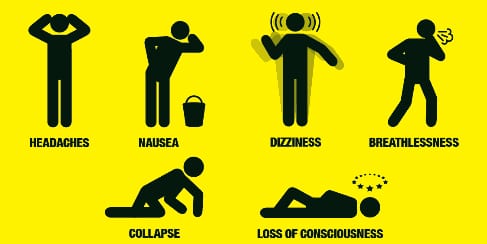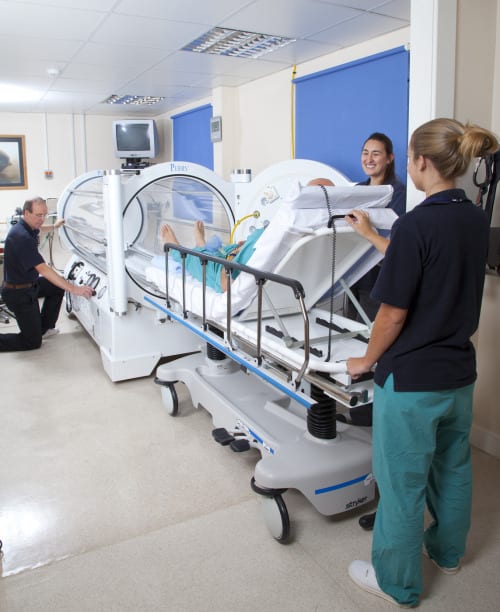Carbon Monoxide Poisoning and Hyperbaric Oxygen
Did you know that the effects of carbon monoxide (CO) poisoning can be treated with Hyperbaric Oxygen Treatment? Find out about CO poisoning symptoms.
Carbon Monoxide Poisoning and Hyperbaric Medicine
What is Carbon Monoxide?
A colourless, odourless gas that occurs as a result of incomplete combustion of carbon containing substance. Examples of when carbon monoxide might occur would include use of poorly maintained gas appliances, burning solid fuel inside, e.g. a barbeque, running a car inside a garage with the door closed, house fires and in contaminated air supplies for scuba divers.
Every year there are at least 50 accidental deaths from CO poisoning in England and Wales and over 200 non-fatal poisonings which require hospital admission.
New data suggests that there is a similar order of magnitude of non-fatal poisonings in people who attend Emergency Departments who are treated for carbon monoxide poisoning, but do not require admission to hospital. This is of great concern as CO poisoning can lead to chronic health problems.
The number of people exposed to CO, but who are unaware of the cause and do not present at their GPs surgery or local hospital is not known, but is likely to be many more.
How does Carbon Monoxide cause poisoning?
Oxygen is transported around the body, bound to haemoglobin (Hb) molecules within red blood cells. Carbon monoxide binds to haemoglobin more strongly than oxygen, such that if carbon monoxide is present, oxygen binding is blocked. If there are significant amounts of carbon monoxide present, oxygen carriage to the tissues is seriously compromised. The heart and the central nervous system are especially susceptible to the abnormally low levels of oxygen.
Where carbon monoxide binds with haemoglobin it forms carboxyhaemoglobin (COHB), which does not carry essential oxygen to the body tissues.
CO also causes damage to the energy production system within the cells of the body, so inflicting further tissue damage as the cells themselves are then unable to produce energy.
What can I do to avoid CO poisoning?
As ever, prevention is better than cure. Many households will have fire alarms or smoke detectors but not carbon monoxide alarms. These are relatively cheap and readily available so ensure you have them fitted.
CO poisoning has become less common since compulsory annual checks of gas appliances were introduced in rental accommodation. Do not use barbeques or camping stoves inside confined spaces or run a car with the garage door closed.
Make sure boilers, heating systems and chimneys are appropriately serviced and in good working order. Only use properly qualified professionals to undertake this work.
What are the symptoms of Carbon Monoxide poisoning?

Symptoms of carbon monoxide poisoning
According to the Department of Health, the commonest symptoms and signs and an indication of their approximate frequency in CO poisoning are shown below:
- Headache – 90%
- Nausea and vomiting – 50%
- Vertigo – 50%
- Alteration in consciousness – 30%
- Weakness – 20%
What should I do if I suspect Carbon Monoxide poisoning?
Open windows and doors to increase ventilation.
Dial for the emergency services if an emergency or attend your nearest Emergency Department.
Address what may have caused the CO poisoning. Any household appliances/equipment should be made safe and checked by properly qualified engineer before put into use again. Consider whether a chimney may be blocked.
How is Carbon Monoxide poisoning diagnosed?
Levels of carboxyhaemoglobin in the body are detected by a blood test which is taken as soon after CO exposure is suspected. The levels found in this blood test will reduce over time so it is important to note when a person with suspected Carbon Monoxide poisoning was removed from the CO source.
How does Hyperbaric Oxygen (HBO) Therapy help in treatment of Carbon Monoxide poisoning?
In the acute instance it may help increase oxygen delivery to areas in the body where insufficient oxygen is being delivered due to the effects of the carbon monoxide (CO) poisoning.
Hyperbaric oxygen therapy speeds up elimination of the carbon monoxide from the body and helps reduce the damage that it causes within the cells.

Mono-place hyperbaric chamber at DDRC Healthcare (Plymouth)
When should Hyperbaric Oxygen (HBO) be considered as part of the treatment for CO poisoning?
Recommendation from the College of Emergency Medicine amongst other sources of expert opinion is that HBO may be useful if a person has suffered any of the following –
- new neurological deficit or mental status change
- carboxyhaemoglobin of greater than 25% at any time
- pregnancy
- evidence of damage to the heart
- loss of consciousness, even if subsequently recovered
The current recommendation is that three HBO sessions are undertaken in the first 24 hours after insult.
What are the longer term effects of Carbon Monoxide poisoning?
CO poisoning can cause longer term nervous system damage and result in problems with dementia, memory and concentration, as well as causing symptoms similar to Parkinsons Disease. Longer term effects of CO poisoning can also cause mental health problems such as depression.
Where can I find more information about Carbon Monoxide?
More information regarding carbon monoxide poisoning can be found online on our website , or at the Gas Safe Charity or Gas Safe Register websites.